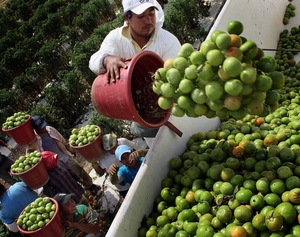
As a consumer would you prefer a product from another country made by adopting fair labour standards as compared to one made within the country with unfair labour means? While this is a question of individual conscience, this piece in the National Review raises a similar issue in the context of tomato grown in Mexico and the U.S. While I do not vouch for the veracity of the facts in the piece, it does make a point that international trade at times can be more equitable or justified in certain contexts.
"Mexican tomato exports to the U.S. have grown rapidly, totaling about $2 billion a year and accounting for half the fresh tomatoes consumed during the winter months; the industry employs some 350,000 Mexicans in Mexico. The Florida farmers have seen their market share shrink and now want the U.S. government to limit the import of Mexican tomatoes.
But not the import of Mexicans. Mexican illegal aliens account for most of the workers in the Florida tomato industry, centered on the town of Immokalee. Worried that the government may get serious about ending illegal employment, the industry has been at the forefront of efforts to import unlimited numbers of foreign workers to slave away in their fields. And I don’t use “slave” to mean the captive form of labor represented by guest-worker programs. I mean actual slaves; there have been numerous slavery prosecutions of Florida tomato growers, whose exploitation of foreign workers is more brazen and appalling than any other industry in the United States."On the condition of the workers this piece had more detail:
"I've seen estimates that nationally, 70 percent of the low-ranking farm workers are undocumented people from southern Mexico and Central America. These people arrive in this country — they're often shipped here from their home villages — and they arrive in a land where they certainly don't speak English. Many of them don't speak Spanish because they're indigenous so they're more comfortable in these indigenous languages."
"They're stuck in the middle of the Everglades in some trailer camp. They don't know where they are. They're frightened to go to the police because they're here illegally and also because back home, the police are often thugs and you don't want to go to them anyway. So they're completely vulnerable. They don't want to make any noise — they just want to work, make a bit of money and that leaves them totally vulnerable."However, there is flip side to this story.What if labour standards are used as a ground to restrict imports of goods? Labour conditions do differ vastly in different countries. Experts argue that the WTO is not the right forum to raise issues of labour standards. It could be used as protectionist tools n the hands of the developed world to restrict imports of products from countries that do not have the same standards as them. Thus while issues of labour conditions, minimum wages, working conditions are critical in the development discourse, linking it to trade may be detrimental to the very workers that it sees to protect.
No comments:
Post a Comment